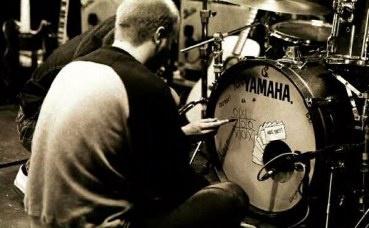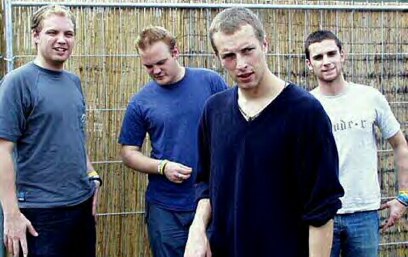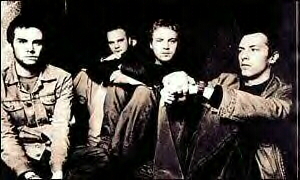back to Coldplay - Life is for Living
Welcome to Coldplaying! | Coldplay News | New Album Special | History | The Band | Releases | Coldplay Interviews | Review Specials 2001 | Chris Martin | Will Champion | Guy Berryman | Jonny Buckland | Parachutes Poll | Coldplay Group Images | Audio Clips | Lyrics | Tour Information | Tour Reviews 2001 | A Day in the Life of... | Coldplay Message Board | Coldplay Artwork | Mailing List | Links | About
Coldplay met at the University College of London in September 1996. It was in the residence halls there that Chris, Jon, Will and Guy established one of Britain's top guitar bands, Coldplay, and, in the process, became the best of friends. "We all lived in the same building and we took the name 'Coldplay' from Tim, one of our other flatmates who also had a band. He decided he didn't like the name any more because it was too depressing," says lead singer, Chris Martin.
 "If I thought it was going to be this boring I would
"If I thought it was going to be this boring I wouldnever have joined the band in the first place."
Chris Martin grew up in Devon (Southwest UK). He first began playing the guitar at the age of 15 by, and has not stopped strumming since. Chris picked up keyboard and piano as well when, and occassionally plays the harmonica. He also recently discovered the art of electric guitar on the North American tour 2001, which was displayed on stage and will be on the upcoming album.
Guitarist Jonny Buckland (from Mold,Wales) began playing guitar at the age of 11.
Drummer Will Champion was born and raised in Southampton, on the South Coast of the UK. Will prefers to play the guitar, but when the band wanted a drummer he offered to play with the sticks and took up the role ever since.
Bassist Guy Berryman originates from Fife in Scotland, and moved to Kent, England at the age of 12. He has been playing the bass since the age of 13.

The band's first release was entitled Safety EP. With the band's own £200, 500 limited copies of the EP were made. The three songs - Bigger Stronger,No More Keeping My Feet On The Ground and Such A Rush, recorded at Sync City Studios, were originaly intended as a demo, but Coldplay was so pleased with it that the EP was released commercially in May 1998.
All 500 copies were to be distributed around London, and only 50 copies were left after the rest had been given away to friends and family.
Simon Williams, co-founder of Fierce Panda Records, saw Coldplay at the Camden Falcon on 7 December 1998. He offers the group a one-off deal and mentions them to the NME in his tips for the following year. The label liked them as much as to ask the band to record a song for them.
In April 1999, Coldplay released the Brothers & Sisters EP under the Fierce Panda label. Because of this, the magazine New Musical Express (NME) tipped Coldplay to be one of the bands of 1999.
The Safety EP, meanwhile, served its original purpose when Debs Wild of Universal Records was enthusiastic. She gave a copy of the EP to Dan Keeling of Parlophone Records and Caroline Ellery of BMP Publishing. The band signed deals with the two companies in early summer of 1999. Brothers & Sisters was played by Steve Lamacq on the UK's top radio station, Radio One, and reached #92 in the UK music charts. Thus, Coldplay began to build their now-enormous fan base.
The Safety EP and the Brothers & Sisters EP helped pave the way for the October 1999 release of The Blue Room EP. Now on their new label, Parlophone, Coldplay began to play at various music festivals in the summer and had supported Catatonia.
The band then felt ready to record their first album. The recording session, however, didn't go as well as planned for various reasons, and Parlophone began pushing for another EP release in hopes that the band could gain some weight under its belt. From the push from Parlophone, Coldplay then released the Blue Room EP. The five-track release was a mix of the old and the new, with the tracks Such A Rush and Bigger Stronger reappearing from the Safety EP to join new songs Don't Panic, High Speed, and See You Soon.
Soon after the the Blue Room EP was released, Coldplay soon recieved criticism for resembling and copying the likes of fellow British band Radiohead. Those comparisons could only be partially denied, as the EP had been written during the wake of Radiohead's 'OK Computer' album.
 Coldplay's first chart entry on the UK Top 40 music chart came with the release of the single 'Shiver' which reached #35 in March 2000.
Coldplay's first chart entry on the UK Top 40 music chart came with the release of the single 'Shiver' which reached #35 in March 2000.At this time, Coldplay was also recording new tracks for the first album, and the album's tracklisting was beginning to change. Due to the uncertainty to the tracklisting, none of the newly-recorded songs could feature as B-sides. It resulted in Coldplay setting aside one mere evening alone to record both B-sides, 'For You' and 'Careful Where You Stand'.
The single Shiver though was received very well by fans and critics. Any previous Radiohead comparisons that had been made were being lifted.
Airplay on the UK's top radio station, Radio One and other top radio stations across the country, in addition to the Shiver video on Europe MTV, helped bring Coldplay into the light. Coldplay's next single release was to be Yellow. With the new album nearly completed, the success of it depended upon the Yellow release.
To help, the band played an excellent performance on one Saturday afternoon at the UK's top music festival at Glastonbury. The performance was later called the highlight of the music festival, and instantly shot Coldplay to fame and to the #4 spot on the UK Singles chart.
'Yellow' did do well for the album, as 'Parachutes' made its debut into the world and entered the UK album chart at #1 a few weeks later. The album gained them many new fans and Parachutes also gained a Mercury Music Prize nomination.
The 5th Member of the band - Coldplay's manager Phil Harvey...
When Phil Harvey dropped out of university to help his mate's band book a few gigs, the last thing on his mind was becoming manager of the musical phenomenon of 2000. But that, in a nutshell, is what happened. One minute he was burying his head in Latin and Greek texts, getting to grips with a classics degree at Oxford University, the next he was organising sell-out tours, holding meetings with the industry's biggest names and cutting six-figure deals for Coldplay.
"I could never have envisaged everything that's happened," he says, struggling to get his head around Coldplay's meteoric rise.
"At the beginning it was just Guy, Jonny, Will and me. Now we've sold more than half a million albums and there's over 1,000 people working for the band across the world."
Coldplay's success culminated in July when their accomplished debut album, Parachutes - already a Number One hit selling 70,000 copies in its first week - was nominated for this year's prestigious Mercury Music Prize. They didn't win but the unassuming 24-year-old manager was hailed as the "future of the music industry," to quote one record label executive on the night. "He defied the sceptics, had faith and now look at them."
But back to the beginning. Phil was just 12 when he met Coldplay frontman Chris Martin in Devon. "He went out with my little sister," recalls Phil. "We formed a band and used to jam at his house. But at the end of the day, he was brilliant and I was below average." So when Chris got together with fellow musicians Guy Berryman, Jonny Buckland and Will Champion at University College London in 1998, Phil couldn't wait to hear them.
"I remember their first gig. It was at a pub in Camden, a real cesspit. I went along just as a mate. But I knew immediately they were really good." Cue Phil waking up one morning last year and deciding to leave his course to help the band set up gigs using the "vague" knowledge he'd gained running student club nights.
"There wasn't really one point in time when I became the manager. I just started to help out more and more," he recalls. "I didn't think I had the skills and I had no industry contacts. It was a very steep learning curve - it still is. "The first obstacle was trying to land a record deal. "It was a case of persistence and luck," explains Phil. "But I wouldn't have had a clue how to negotiate a record contract or set up a world tour if I hadn't had the enthusiasm to learn."
He badgered music industry executives, A&Rs [whose job it is to "discover" new talent] and critics to see the band. "Every now and then one of them would turn up and whenever they did, they loved them. That got the ball rolling."
Phil funded the band's first release, the self-pressed Safety EP (500 copies were produced, now worth a fortune). Journalists started to rave about the "classic fragility" of their acoustic ballads and uplifting folk. And DJs _ one being Radio 1's Steve Lamacq - started playing it.
The turning point came after a rave review in the NME when 70 record company scouts came to see them play. Phil eventually signed with record company Parlophone. "We just thought they were the best label around with an impressive roster of bands like Radiohead and Supergrass," he explains. The juggernaut of fame began to roll. A mid-afternoon set at this year's Glastonbury Festival drew a rapturous response from 10,000 newly devoted fans - and comparisons with Travis' 1999 appearance.
Their second single, Yellow, entered the charts at number four, taking everyone by surprise. And when Parachutes entered the charts at Number One in July and turned platinum four weeks later, euphoria ensued. "That was a scary moment," Phil recalls. "I thought, 'Can I actually deal with this level of success?' I'd just been managing for a year and suddenly Coldplay had become this big-selling, worldwide act."
But the fear that he couldn't cope subsided and no one suggested Phil should make way for a more experienced manager. "Lucky for them they didn't. I would have been livid," he says with obvious passion.
Only last week the band were nominated for three awards at a Q magazine ceremony - more than any other act. But Phil remains happy taking a backseat in the fame stakes. When Chris dragged him up on stage at the album launch at HMV, he hated it ("that was the first and last time"), although he was persuaded to join in the T2 photo-shoot.
"I'm also really competitive," he admits. "When we didn't win the Mercury Music Prize, the band were just pleased Badly Drawn Boy had won. But I was gutted. I always want them to be Number One."
Thanks to Jenz (Co-writer and Co-editor)
Welcome! | Latest News | About | Mailing List | Sign Guestbook | Read Guestbook | Contact Us | Index
|